Signs Your Dog Is Dying
As a pet owner, it can be extremely difficult to see your once active and bright pup begin to slow down and lose the light in their eyes.
You are not sure if your dog is just going through a phase, has a mild illness, or is in the process of dying.
You also do not want your dog to suffer, and have so many questions about what you can do to keep them comfortable.
These can definitely be trying times and a roller coaster ride of thoughts and emotions for any pet parent.
In this article we will explore these difficult thoughts, signs your dog may be nearing the end of their life, decisions you will need to being making, and the process of death in dogs.
These are the signs to watch for when your dog is close to dying:
- Restlessness
- Labored breathing
- Decreased appetite (stops eating)
- Decreased thirst (stops drinking)
- Pain / doesn’t want to move because of pain
- Lethargy (lying around a lot)
- Incontinence or forgetting their potty training
- Reduced mobility
- Increase in vomiting
- Unusual behavior such as being near you or wanting to be alone
- Loss of consciousness
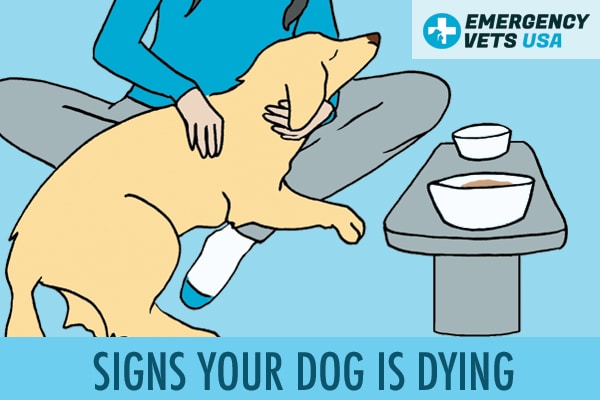
Dog Behavior Before Death
The behavior of a dog before death will depend on a number of things.
First, every individual dog is different and may behave in their own unique way.
Oftentimes only their owner will know that something significant is going on.
You know your pet best.
For example, if your dog usually lived to eat and now they need encouragement to eat their favorite food, this may be the way your dog demonstrates they are declining.
For other dogs, it may be that they are less social and prefer to be by themselves.
Still, for others, it may be that they want nothing to do with their favorite toy.
How they behave will depend on if there is an on-going medical condition that may be making them uncomfortable, feeling really sick, or in pain.
For instance, dogs with kidney failure or liver failure may have nausea and a lack of appetite.
Dogs with advanced heart disease may have significant coughing and difficulty breathing.
And dogs with significant arthritis, may be unable to get up to walk to their food bowl.
There are some instances where death occurs all of a sudden:
- Severe trauma
- The inability to breathe
- Heart attack
However, for many dogs the process of dying can occur over the course of days to weeks to sometimes even months.
You may see a gradual change in behavior and activity over this time.
Your dog may have good days and bad days.
What you will need to look out for is if they are having more bad days than good and if their individual quality of life begins to diminish.
Is My Dog Dying Or Just Sick?
If your dog is acting abnormal and doesn’t seem right, you need to schedule an appointment for them to be examined by their veterinarian.
Your vet can examine your dog, recommend any necessary diagnostics, and they can help guide you in making an informed decision about the health and quality of life of your pup.
It is always best to seek out professional help if you are unsure what is going on with your dog.
If your dog is just lying around and not moving (and this is very abnormal for them), you should immediately take them to the closest emergency vet clinic.
Having them evaluated by a vet will provide you with answers regarding if they are just sick or if they are dying.
If your pup is not feeling well, but turns out to have a treatable illness, getting the diagnosis and treatment started right away is key to helping them pull through.
However, if your vet examines your dog and determines they are likely dying and there is nothing they can do, your vet can then discuss with you what the next steps should be.
There is really no way to know for sure without having a veterinarian examine them.
If your dog is not able to move and you are having trouble getting them in the car to go to the vet, call your vet’s office to see if they can come to your house.
Many vets are offering in-home service these days.
If they are unable to come to your home, see if they know of any local vets who do house calls.
Even though this may be a little more expensive, it can be a wonderful, more comfortable option for dogs and pet owners alike.
9 Signs Your Dog Is Dying Or Near Death
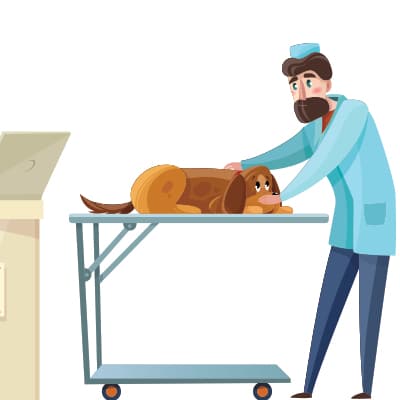
Old age is not a disease – a common saying among veterinarians.
For many dogs, aging can bring on physical and behavioral changes.
But, it does not necessarily mean they are sick or dying.
Their bodies are just adjusting with certain limitations brought on by the aging process.
That being said, there are certain things to watch for that may indicate your elderly dog is nearing death or in the process of dying.
You will usually see more than one symptom listed below:
- Restlessness
- Labored breathing
- Decreased appetite (stops eating)
- Decreased thirst (stops drinking)
- Pain / doesn’t want to move because of pain
- Lethargy (lying around a lot)
- Incontinence or forgetting their potty training
- Reduced mobility
- Increase in vomiting
- Unusual behavior such as being near you or wanting to be alone
- Loss of consciousness
We will now break each of these down into more detail.
Remember, dogs who are sick because of medical conditions, but not necessarily near death, can also exhibit these symptoms.
However, we are focusing just on elderly dogs who do not have any other explained treatable medical condition in this particular article.
1.) Your Dog Is Restless
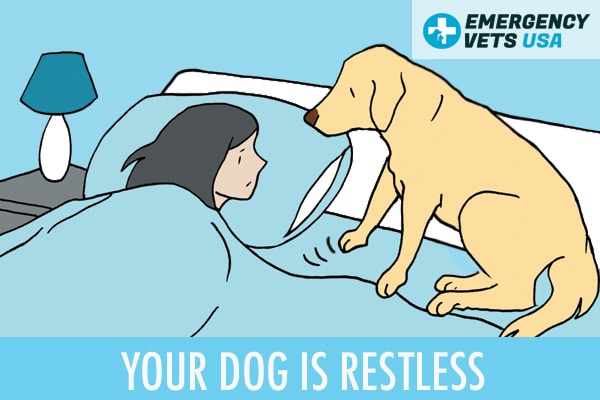
Some dogs, when they are near death, can become very restless and agitated.
They may pace back and forth or be unable to sit still.
This may be due to pain or something uncomfortable within their body.
It can also sometimes be due to changes within their brain.
As some dogs get old, they can develop certain cognitive changes, similar to people with Alzheimer’s.
This condition is called Canine Cognitive Dysfunction.
In addition to the restlessness, they may be up all night pacing, or they may forget their normal potty training and have accidents in the house.
For some dogs with these symptoms, certain supplements and medications can help to try to keep them relaxed.
Melatonin and S-Adenosylmethionine (SAMe) can sometimes help, as well as a prescription medication called Selegiline.
There are even special prescription foods available for dogs with cognitive dysfunction symptoms.
Talk with your veterinarian if you think your dog may benefit from these medications or foods.
2.) Your Dog Has Labored Breathing
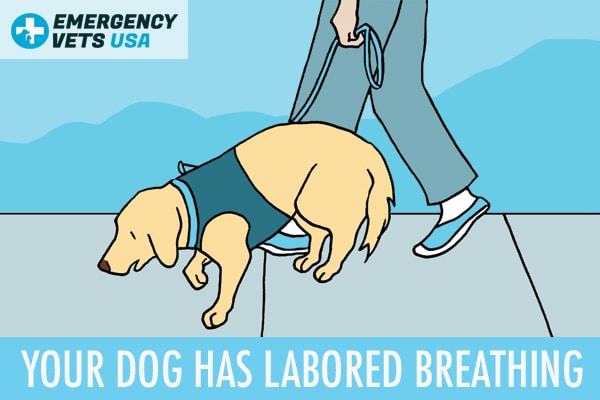
If your pup is having difficulty breathing – extending their neck out, breathing with their mouth open as though gasping for air, unable to lie down due to trying to breathe – call your vet right away.
These could be signs death is imminent and you will need to see if there is something that can be done to save your dog or if you need to make a decision to end their suffering.
For other elderly dogs that may not be actively struggling to breathe, you may notice a change in their normal breathing pattern.
They may breathe heavier or deeper than usual.
They may even breathe louder.
It may be harder for them to get up and move around, so even just getting up and walking to their food bowl may cause them to breath faster or heavier.
Try to make life as easy as possible on them.
Keep their food and water bowls easily accessible.
Keep them close to where they spend most of their time, so they do not have to walk long distances to get to them.
Do what you can to keep your pup calm as well.
Sit down with them and give them love and attention.
Try not to make them get up and be active if it causes them to exert too much energy on their part.
3.) Your Dog Stops Eating
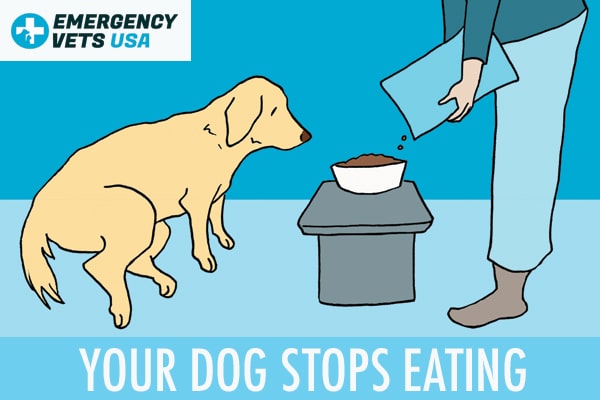
Most dogs love to eat. Meal time is their favorite time of day.
In fact, many owners know their elderly dog is dying or something is very wrong when their dog begins eating less or they have to be encouraged to eat.
That being said, there are some dogs who will eat right until the very end.
You may notice your dog losing weight as they start to lose muscle mass from inactivity and from eating less.
As they become weaker, they just might not have any energy, enthusiasm, or appetite for food.
You can offer your dog home-cooked meals, including chicken and rice.
You can also try to entice your dog to eat by putting a little baby food (not any with onions or garlic, though) or lunch meat in their regular food.
Your vet may also be able to prescribe an appetite stimulant to encourage your dog to eat.
However, if your dog has refused food for 3 or more days and there is not another medical reason causing their lack of appetite, their body may be starting to shut down.
4.) Your Dog Stops Drinking
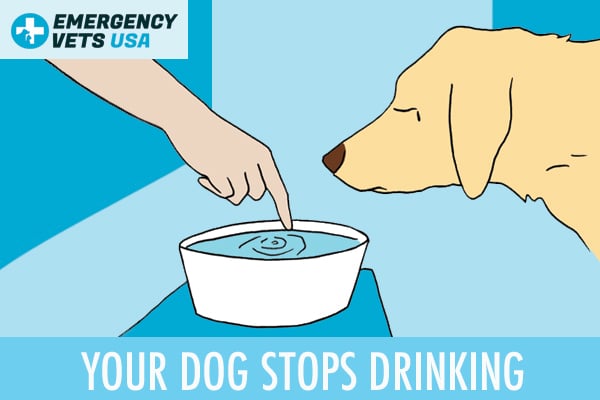
Some dogs may stop drinking.
They either just don’t have the energy or they may feel nauseous with water in their belly.
If your dog refuses water for more than 2-3 days their kidneys can be gravely affected.
Try to keep fresh water available near them, and even offer them water regularly by holding the bowl in front of them.
At this point, it is okay to add in a little Gatorade to make the water taste good to encourage drinking.
Make sure it does not contain any artificial sweeteners, such as Xylitol.
Offering your dog canned, wet food can also help, as it has a higher moisture content than kibble, which can help with hydration.
5.) Your Dog Is In Pain
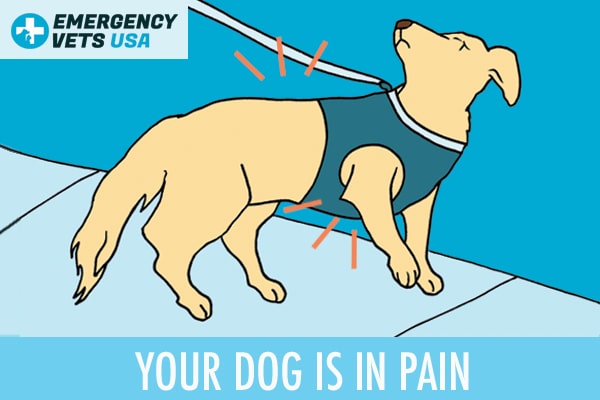
Dogs that are near death can be in pain.
You may notice your dog avoiding interaction to try to avoid being touched in certain ways that hurt.
You may also notice your dog whining more, yelping out more, or even growing or attempting to bite if they are manipulated in ways that cause them pain.
Always check with your vet to see if there is anything that can be done to help their pain.
There are so many safe, newer medications available now to help alleviate our pets’ pain, even in their final days.
6.) Your Dog Is Lethargic
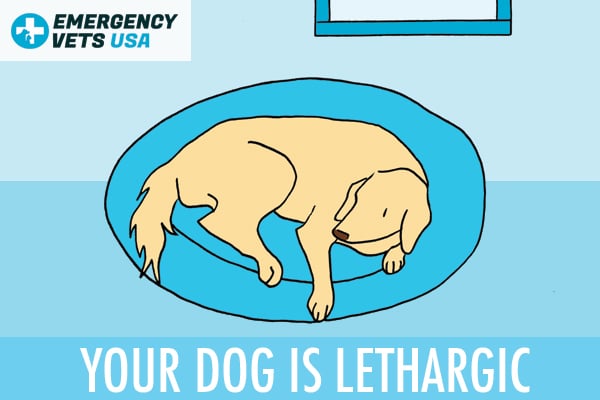
Many dogs that are in their final days or weeks of life tend to lie around a lot.
They just do not have the energy to get up and greet you at the door anymore.
They may not be interested in their favorite toy or ball.
Even if they are, they may only be able to sit beside it or hold it in their mouth.
You may notice them sleeping for the majority of the day. You may even have to bring their food and water to them.
Let them set the pace for things and help them where you can.
Monitor their daily activities and behavior closely to help gauge when their quality of life is diminishing.
This can help you determine if they are comfortable enough or if you need to decide upon euthanasia.
7.) Your Dog Becomes Incontinent
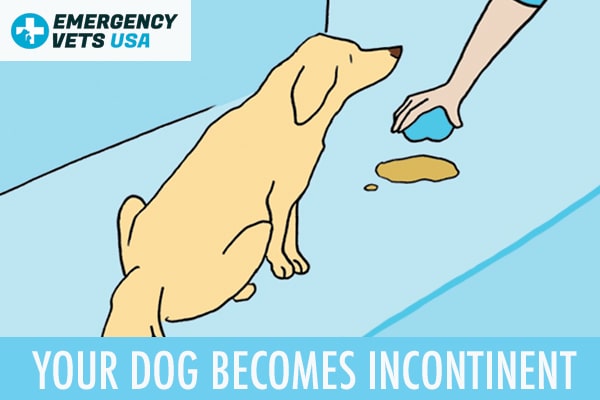
Your dog may become incontinent if their kidneys begin to shut down.
They will be producing so much urine that they just cannot hold it in.
Additionally, many elderly dogs have painful arthritis, which makes it difficult to get up as often as they need to go outside to relieve themselves. So, they urinate on themselves instead.
This can also be the case for bowel movements.
Some dogs that are just too weak or have painful hip and knee joints will not be able to properly squat to relieve themselves outside normally.
This could be why they pass stool in the home or even while lying down.
8.) Your Dog Has Reduced Mobility
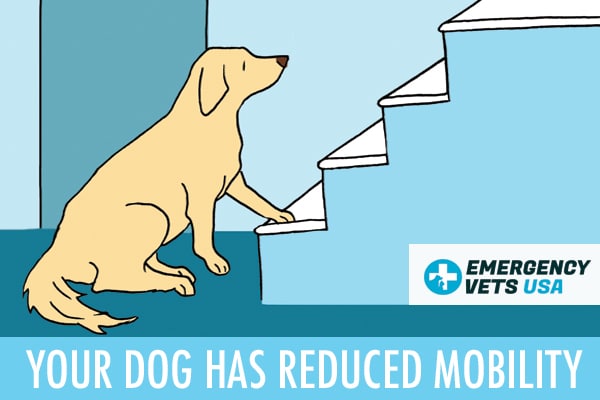
Unfortunately, for many large and giant breed dogs (Great Dane), the decision to euthanize ultimately is determined by their inability to walk.
They are at a higher risk of developing immobilizing arthritis and other joint problems in their old age.
With their size, it is extremely difficult for their care takers to manage them long-term, as they need to be lifted often, or helped outside.
They can also easily get bed sores, which can become infected.
Not being able to move around is definitely a quality of life issue for larger dogs.
Incoordination, weakness, and falling over are also symptoms that can be seen in smaller and medium-sized dogs that may indicate their body is starting to shut down.
9.) Other Symptoms
Some dogs will become less social as they get closer to death.
They do not want to be a burden on their family and they tend to wander off, wanting to be left alone.
Sometimes this can also be due to their anticipation of pain, as mentioned earlier.
How To Comfort A Dying Dog
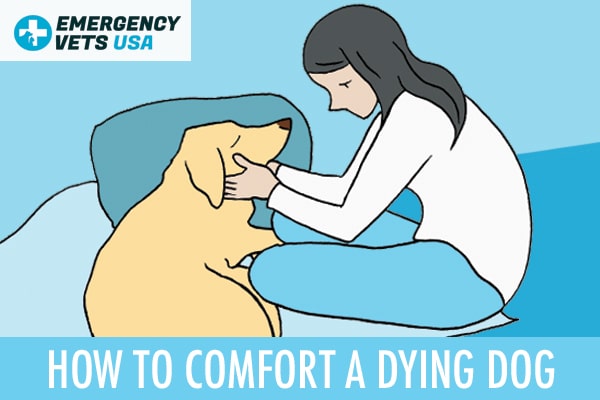
If your dog is near death or dying, you certainly want to make them feel as comfortable as you can.
If they have a medical or painful condition, make sure to continue giving them all of their prescribed medications.
These medications may be controlling some of their pain, so it is best to continue them unless your vet recommends otherwise.
Stay near them and give them regular attention and affection (if this is what makes them happy).
Offer your dog a very comfortable, quiet place to rest.
If they prefer to be in the middle of the room with everyone, put their bedding there.
However, if they keep wandering off to be by themselves, then you can move their bedding into a more private location to give them their space.
Check on them regularly and keep them clean and dry.
Some dogs may not be able to walk outside to use the bathroom and may be too big for you to carry.
If this is the case with your dog, you can keep “potty pads” underneath them, changing them out regularly.
Use a warm wash rag to clean under their tail to prevent urine scald and matted fur.
It may even be a good idea to use some clippers to trim away any excess fur they have under their tail and around their rear end to keep the area clean.
Finally, if you are sure your dog is near passing, or if you have scheduled them to be euthanized, you can offer them whatever their favorite food is and just spoil them for the day.
Some dogs prefer ice cream, while others may like a cheeseburger or French fries.
Try not to overdo it, though, so they don’t get an upset stomach.
There are many vets who can euthanize your dog at home, which can make the entire process less stressful for both you and your dog.
The Dog Dying Process
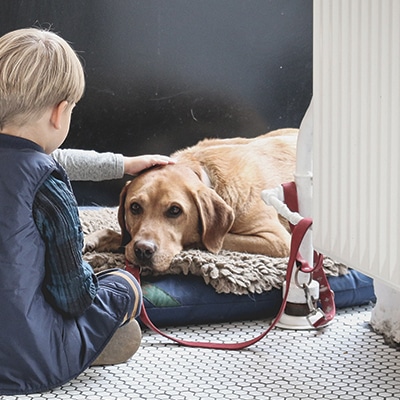
If after consulting with your veterinarian, you think your dog is dying, there are some things you will need to decide upon.
Begin the thought process and conversation with family members and your vet about if you will let your dog pass naturally or if you will help them pass by having them euthanized.
Oftentimes these decisions can be lucid and change on a daily basis.
But at least you are thinking about them regularly, which can ultimately help you when the decision needs to be made.
Other things you will need to consider is after care.
Once your dog passes, do you have a place to bury them, or do you want them to be cremated?
Consult Friends And Family
During your dog’s life they probably had many people who were affected by them and loved them.
Keep these people in your thoughts as you are making preparations for your dog’s passing.
Some of them may want to come visit your pup one last time.
These folks can also be a means of support for you as you go through this difficult process.
Even though it may be hard, it is best to talk to friends and family and let them know how you feel.
Getting the emotions out and leaning on others can help you work through grief.
Many times the grieving process surrounding pet loss starts well before your pet actually dies.
The agonizing thought process of when to euthanize, should you euthanize, and will your dog ever just pass on their own, can be a grueling process.
Not to mention all of the time, care, and attention you are providing your dog during this time.
Sharing your struggles and thoughts with friends, family, and your veterinarian can help you while working through this.
Natural Passing Of Your Dog
There is nothing wrong with letting your dog pass naturally.
In fact, for many dogs this may be the best option for them.
If your dog is not struggling to breath or in agonizing pain, letting them slowly pass on their own is perfectly fine.
It would still help to have a veterinarian involved in the process, so they can help guide you on your dog’s comfort level.
Many vets offer hospice and end-of-life care for pets and their families these days.
They can do visits to your home and daily to weekly phone consultations with you to see how your pet is doing and where they are in the process.
They can also provide you with medications to help with any minor pains your pet has or other concerns you have.
Make sure to try to keep your pet as comfortable as possible, with soft bedding that is cleaned regularly.
Offer them food and water throughout the day or keep their food and water bowls near to them.
Check in on them regularly and sit down to spend ample time with them.
Most of us hope our pet passes naturally in their sleep.
This can definitely happen for some pets.
For others, the process of passing naturally may involve their heart rate and respiratory rate initially speeding up, then all of a sudden slowing down.
They may leak urine or stool during this process and they may shake or have tremors.
What specifically happens will be different for each individual pet.
If you are ever unsure, it is always a good idea to call your vet to get direct advice.
Euthanizing Your Dog At Home Or In Your Vet’s Office
If you have decided the right thing to do is to euthanize your dog, you will need to schedule an appointment with your veterinarian.
If you feel your dog would be more comfortable staying in your home, request an in-home euthanasia from your vet or see if they can recommend any local vets who offer this service.
Don’t worry, if you feel your dog needs to be put down right away, most vets will accommodate and work this into their schedule.
They understand the need for this and you should not feel uncomfortable asking for immediate assistance for your dog.
The Euthanasia Process
During the euthanasia process, your dog will be given a sedative to help them relax and gently go to sleep as if they were getting ready to go into surgery.
Once they are asleep enough from the sedative, the vet will give them an injection of the euthanasia solution.
This injection will cause their breathing to stop and then their heart to stop.
Rest assured, they will not feel any pain or discomfort, and they will quietly and easily pass.
What To Expect After You Euthanize Your Dog
Your dog may take one last deep breath as their heart rate begins to slow down.
As their body relaxes, they may urinate or defecate.
They may also have some residual nervous system activity, causing some of their muscles or their nose to have some minor twitching. This is completely normal.
Some dogs may keep their eyes open as well, and this is nothing to be worried about.
It is natural for their eyes to stay open, even if they pass naturally.
Once your dog has passed, you should be able to spend as much time with them as you want.
When you are ready, if you have decided to have their remains cremated, your vet will make arrangements for the cremation facility to come pick up your dog.
If you elected to have their remains returned to you, such as in an urn, the cremation facility will return the urn to your vet’s office for you to pick up usually within 1-2 weeks.
Your vet may also offer burial in a pet cemetery so you don’t have to worry about what to do with the body when your dog dies.
It can be devastating to lose a pet.
It is important to talk about your feelings with people close to you.
Sharing memories of your pet with others can help you through this process.
You may even find that other people appreciate it as they may have had to go through the same process with one of their own pets.
Your vet clinic may even offer grief counseling or have resources available for you during this tough time.

Leslie Brooks graduated from the University of Tennessee College of Veterinary Medicine in 2012. After graduation she moved to Indianapolis to do an intensive one-year internship at a specialty practice and then began working as a small animal general practitioner. She ran her own house call practice for three years, visiting pets in people’s homes. Currently, she works part time in clinical practice and volunteering her free time to serve pets of the homeless. Read more about us here.

Jake is 10 years young, 96 lb Labrador and my heart.
Tonight he isn’t able to stand without doing the splits. He’s breathing very hard. He’s crying and I feel horrible that he must be in pain. I gave him a tramadol his vet prescribed for his arthritis…it helped relax his breathing & him. I’m so afraid he’s going to die on me tonight, we’re in a rural area and cannot get him to a vet until morning because there isn’t an emergency vet close…he’s drinking water & ate his 5pm meal. He’s gone out to ‘get busy’ with support of a towel under his midsection and us coaxing and lightly lifting him up.
He’s had tremors, like small seizures for about a year and the vet said not to be concerned with it & took him off the tick and flea meds the fall of 2021, I quit giving it to him back in July 2021…because I felt the medication gave him the tremors and small seizures.
My 15 year old dog has for some time now gone down badly, his eyesight and hearing is very poor. He just lies about sleeping all the time except when I go out of the room he follows me and lies down wherever I am. He drinks quite a bit but appetite varies from day to day. He now urinates in the house. His back legs are no longer straight. I feel he has no quality of life, and looks sad most of the time. Our vet is coming tomorrow to euthanize him. My heart is breaking but its not fair to keep him going with little quality of life. Am I right to do this?
Hi Margaret, so sorry to hear this. In terms of dog life, 15 years is a pretty good life. Sounds like you treated him well. The hardest part of putting our dogs to sleep is choosing when to do it. Most people tend to wait too long and their dog starts to suffer. For you, you are correct. If there is no quality of life, don’t wait because having them suffer would be a worse outcome. You are doing things right by having your vet come to your home to do the euthanasia. Less stress and anxiety for your pup for sure plus they will be in a place they love and will be at peace the whole time.
Hi my dog is 15. He still will go a walk but on a lead as his sight and hearing are poor and he gets anxious a lot. He sleeps most of the day but is very restless at night and his breathing is loud. He isn’t doing the toilet in the house but can no longer bend to poo. Main concern is that he is snapping at my kids and other pets a lot. I can’t brush him cause he’s in pain and his breath is really bad. Still eating and drinking more than usual. Thanks.
Hi Clare, hope you have taken your dog to your local vet where they can do an exam. Wondering if something else may be going on besides just age. The hardest decision you can ever make is putting your dog down so that they don’t suffer. If their quality of life is down and they are in pain all of the time, that conversation might need to take place with your vet to see what other options you may have.
Hi. We are reading this because we, too, have an elderly dog who is pacing and losing interest in her food. She just had a giant seizure, which she gets medicine for. We noticed that her urine smelled awful, and it turn out she has a bad UTI, even tho she goes to a specialist who checks her urine. Bad breath can be dental issues or a UTI. Cheese whiz gets the pills down. Good luck to you in figuring out what is best for your fellow. What size is he? Ours is small, so they live longer…we found her by the road 25 years ago and know she is either 16 or 17.
Hi Clare, does your dog vocalize a lot, especially in the night? Does he pace up and down and/or go around in circles? If yes, then it COULD be dementia. But i would advise you to bring him to the vet immediately. My 20 year old beagle is having severe dementia, also has stage 5 heart murmur and arthritis. We brought him to the vet pretty late and now, his health and weight is deteriorating. 🙁
Please take your dog to the vet and don’t wait. Sending u positive vibes and energy to your dear pooch. ????????❤️